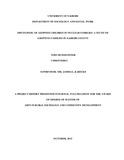| dc.description.abstract | This study sought to establish how adoptive parents discipline children under their care and the
consequences of their actions. It was guided by specific objectives which were: - to find out the
various methods that adoptive parents use to discipline their children within the nuclear family; to
investigate the effectiveness of the disciplinary methods used by adoptive parents in modeling an
adopted child’s behavior; to establish the alternative discipline options that adoptive parents use
when they are unable to tame their children. The study interviewed 42 adoptive parents, 9 adopted
children, and 11 key informants comprising of adoption officers and children officers. There were
also 6 observations of the adopted children interviewed. The study used semi-structured
questionnaires to collect data.
Data collected was analyzed using both quantitative and qualitative methods. Descriptive statistics
such as frequencies and percentages were used to analyze quantitative data. Results of quantitative
data analysis were presented in tables and charts. Results of qualitative data analysis were
presented in narrative form. The study established that adoptive parents used various methods to
discipline their children within the nuclear family. These methods included caning, spanking,
pinching, warning, threats, talking to the child, suspension of some privileges and use of isolation
corner.
The study found that the disciplinary methods used by adoptive parents in modeling an adopted
child’s behavior have been effective. The effectiveness of the methods used was validated by the
people in the family who said that the way 92.9% of adoptive parents discipline their child is
appropriate. It was also confirmed by the fact that 95.2% of the adoptive parents never took their
child/ren for counseling due to unbecoming behavior. The study found that the alternative
discipline options that adoptive parents have when they are unable to tame their children include
canning and counseling. Many parents would cane the child or refer them to a counselor or the
authorities like chief. The study established that adopted children are unique and require special
attention on the way they are disciplined. According to the findings it is the role of the parents to
bring up the child in the right way..
This study concluded that adoptive parents used different methods to discipline their children
based on the situation and the age of the child in question. The study also concluded that adoptive
Parents need counseling to understand the various changes that take place as a child grow in order
to be well prepared to model positive behavior and cope with challenges that come with parenting.
Although the methods used byadoptive parents to discipline their children have been effective,
they are not the best because some of them like caning might cause physical harm on the adopted
child and some of these methods might border on battering or abusing the children which are
unlawful. Adoptive parents therefore need to evaluate their disciplinary methods to ensure they are
in the best interests of the adopted children.
This study recommends that the children department and adoption agencies should counsel
adoptive parents thoroughly before adoption to ensure they are ready for parenting challenges. It
recommends that adoption agencies, societies and nongovernmental organizations should organize
seminars and workshops to equip adoptive parents with parenting skills as their children grow. The
adoptive parents should not carry the burden of bringing up adopted children alone rather they
should involve mentors as well as other social agents like church/mosque, school and family
members to contribute positively in modeling positive behavior to adopted children. | en_US |

